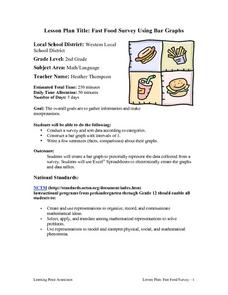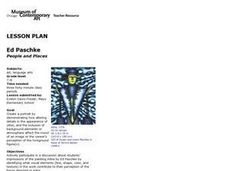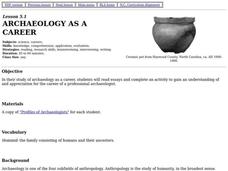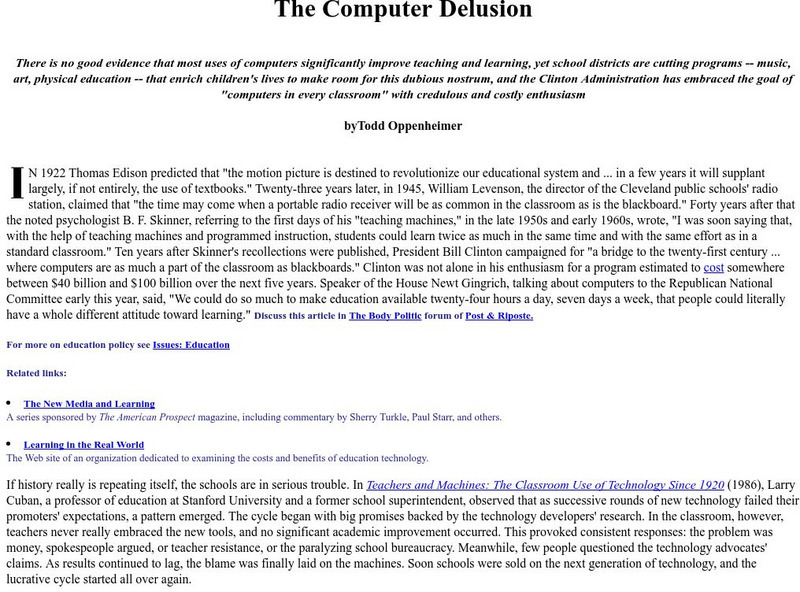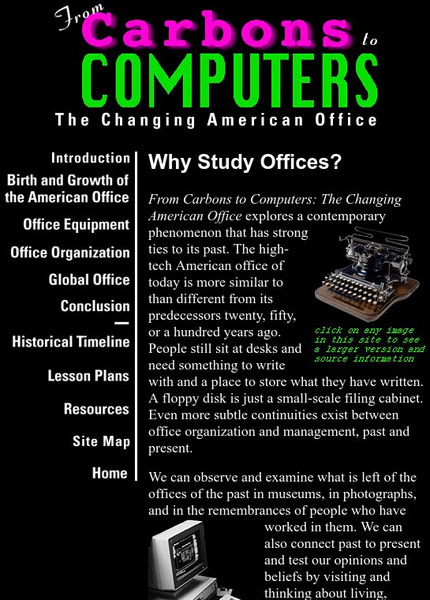Curated OER
What Difference Do Good and Bad Make?
Students discuss the characteristics of good citizenship, listen to the story, The Boy Who Cried Wolf, and develop and present skits demonstrating examples of good and bad behaviors.
Curated OER
Historical Research on Explorers of Canada
Eighth graders study an online atlas of Canada to research an early explorer.
Curated OER
Cloud Database
Students research information on the types of clouds. They create a database and use a formula. They create various reports and access electronic information to obtain accurate pressure and temperature readings from the National Weather...
Curated OER
Fast Food Survey Using Bar Graphs
Second graders conduct survey and sort data according to categories, construct bar graph with intervals of 1, and write a few sentences about their graphs.
Curated OER
People and Places
Fifth graders investigate how the geography of the land effected the human experience of the Lewis and Clark Expedition. They research using primary and secondary sources, design a map.
Curated OER
Graphing Water Temperature
Students graph water temperature using probe software and a Palm on a class field trip to a lake or pond. Emphasis is placed on collaboration with high school science students and the use of ImagiProbe software.
Curated OER
Distinguishing Clan Roles
Students discuss the roles of the 8 Seminole clans: Wind, Panther, Bird, Snake, Bear, Big Town, Deer and Otter. They discuss the matriarchal nature of the Seminole sociey. They interview family members and then create an illustrated...
Curated OER
South Carolina and Quebec - A Comparative Study
Students compare the structure and functions of the state government of South Carolina and the provincial government of Quebec. They examine the role of political parties and differing expressions of democracy and make a...
Curated OER
Coming to America
Students examine the various cultures of the immigrants who came to America. Using the internet, they research various ethnic and cultural groups within the United States. They identify the reasons why people immigrated to the U.S. and...
Curated OER
A Change of Climate
Young scholars research various sources to learn about global warming. They then create a multimedia presentation about global warming. They take a stance on the issue and present that as well.
Curated OER
History repeats: 'Boat people' on the Afghan and the Tampa
Students investigate the Afghan incident of 1888, where a ship, the Afghan, with a load of Chinese passengers from Hong Kong was refused permission to land the passengers on Australian soil. This controversy is compared to the Tampa...
Curated OER
Class Conservation Corps (CCC)
Students investigate how the loss of soil, a valuable natural resource, affects their lives through loss of productive land to grow food, loss of coastal land mass, and poor water quality from runoff. They design a project to keep soil...
Curated OER
Archaeology as a Career
Fourth graders read about archaeology as a career. They develop a list of questions they would like to ask an archaeologist and then actually interview an archaeologist on the future of archaeology as a career.
Curated OER
Harry S Truman National Historic Site
Students examine the early years of Harry Truman to determine how his upbringing influenced his character. His political career from county judge to president is explored and some of the decisions made as a politician, evaluated.
Curated OER
Store Wars: When Wal-Mart Comes to Town
Students watch video clips about the effects of Wal-Mart coming to towns. They develop a cost-benefit analysis related to the proposed store. They write their mayor listing their recommendation for the new store.
Curated OER
Properties of Elements
Eighth graders explore information about the periodic table of elements. Using the Internet, 8th graders choose one element to research. They complete an "Adopt and Element" information sheet. Using Microsoft Word, students create an...
Curated OER
Egyptian Expedition
Students identify and analyze ancient Egypt and interpret how to develop bibliographical references. They research topics using multiple resources and various forms of media of media. Finally, students practice and deliver an oral...
National First Ladies' Library
Pandemics: The Swine Flu of 1918
Students study pandemics through the investigational research of the 1918 swine flu. They apply the information by choosing a current virus and role-playing a member of the Centers of Disease Control (CDC).
Ted Nellen
Cyber English (By Ted Nellen): Oppenheimer: The Computer Delusion
A controversial article from The Atlantic magazine suggesting that there is no evidence to show that using computers in schools improves either teaching or learning. Argues against cutting enriching programs in art and music to fund...
TeachEngineering
Teach Engineering: Hurricane! Saving Lives With Reasoning & Computer Science
Students develop and apply the distance formula and an x-y coordinate plane on a hurricane tracking map, and then use a map scale to determine distance in miles. Then, using MATLAB computer science programming language, students help...
Other
Internet Society: A Brief History of the Internet
A brief history of the internet, written by those who were involved in the development evolution of the Internet. This history revolves around four distinct aspects: the technological evolution, operations and management aspect of a...
Smithsonian Institution
Smithsonian Education: From Carbons to Computers, the Changing American Office
A site including lesson plans, photographs, and text about the offices of yesterday and those of today. Topics discussed include office equipment, office organization, globalization, and technology. Also included is an historical...
Country Studies US
Country Studies: Us: A Society in Transition
The 1980s were a time of tremendous change in the US. Computer technology, an increase in service-sector jobs, changing population patterns, homosexuality, AIDS, and changing immigration patterns were just some of the changes Americans...





